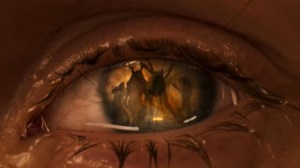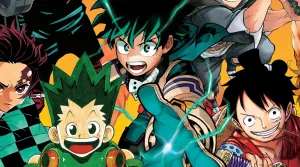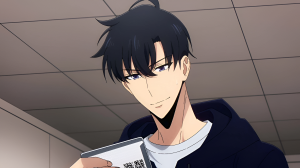Last night, longtime writer/producer Marc Guggenheim‘s first directorial job — an episode of DC’s Legends of Tomorrow in which the cast are tossed through a series of different TV genres. It was a big first swing, in part becauset inherently gave him an opportunity to test a few different kinds of skillsets as a director. Guggenheim, who told ComicBook.com that he had wanted to direct the season’s penultimate episode in order to be as far away from the “Crisis on Infinite Earths” events — for which he served as showrunner — as he could be without directing the finale, ended up working quite a bit with Olivia Swan and Shayan Sobhian, neither of whom he knew especially well at the start of the shoot and both of whom had significant roles in “The One Where We’re Trapped on TV.”
Videos by ComicBook.com
In the episode, which aired following the second episode of DC’s Stargirl, Gary and Mona wake up in a distopian nightmare with no memory of their past lives, and end up trying to save the Legends. The heroes are living lives inside of various TV shows, and have to be brought together and brought out of their new realities in order to set up the season finale, in which the Legends will have to inspire humanity to stand up to the Fate.
Guggenheim joined ComicBook.com to discuss the episode, and while we have already shared some of the least spoilery bits, now that the episode has aired and spoiler shields can be down a little bit, we wanted to share the full text of the Q&A.
As somebody who loves these characters and as a fan, is it exciting for you to have your fingerprints on the Newcastle Incident in this kind of cool way? I know that Matt has, ever since he took the job at NBC, been champing at the bit to follow up with Astra.
Yeah. Honestly, I love the characters, but the actors are just such great people. Matt [Ryan] and Olivia were so good. Everybody gave me their A game, and was so much fun to work with. We ended up, I think, all having a really nice time. I remember the first day, we had a 14-hour day with a crazy number of setups and the techno dolly, and we were running out of time and line producers are panicking, but we still were just laughing, and I think that feeling found its way into the episode.
Fates be praised
The flip side to the laughing is obviously the Gary/Mona/Clotho stuff. You’ve been with Legends from the very beginning in one capacity or another and you’ve seen all of the things that Maisie has had to do to keep up with the demands that the show has put on her. This feels like another completely new chapter for her character. How was that, watching her work through the third iteration of Charlie?
It was really a pleasure. I love how Maisie is, she’s always game. She always gives a thousand percent. She never complained. You never feel as if the character has gone in a direction that she didn’t want to play. She’s up for anything. I think probably the most rewarding part of working on the episode was the ability to work with all the actors, and to work on shaping the performance. That was something that I knew I would enjoy, but it wasn’t until I was actually doing it, that I just realized exactly how much I enjoyed it. There’s nothing more gratifying than having a conversation with an actor about a certain take or a certain moment, and then watching them go and execute on it. there’s no better feeling.
Does it kind of feel to you, as somebody who’s written superheroes for over a decade now, that what Charlie does this episode is just an exaggerated version of the thing that we’ve seen Oliver and Barry get chastised for? It’s like, “No, I’m doing this for your own good,” without realizing that people didn’t ask for that.
Yeah. I think you absolutely put your finger right on it, which is that in all the shows, the characters will do something for the greater good, but there’s an element of playing God as well. I think to me, that’s the best part of writing superheroes, is wrestling with all the moral dilemmas. I’m very attracted to that. Not just “with great power comes great responsibility,” but how do you wield that power? I’m a sucker for that. I’m always into that.
Navigating TV Land
Was there any of the sequences that was particularly challenging? To me it’s like, the visual aspects of the Star Trip stuff seems like an obvious answer, but then again, you have the fact that the Ultimate Buds set was one of the only sets that wasn’t a standing set you guys already had.
I would say that the stuff that made me the most anxious was all the stuff on the Friends set, for two reasons. Number one, I wanted to shoot it like a multi-cam. That immediately placed certain limitations on me. Also, it’s a lot of the episode; it’s a huge number of pages and we shot all of that in one day. I was just, quite frankly, intimidated by the sheer amount of material we needed to get in a single day. On the one hand you could say, well, I’ve never directed anything before, so why is that much harder than directing a multi-cam for the first time? The answer is I’ve at least worked in one hour drama for 20 years. I have a much greater sense of how footage gets edited together when you’re filming with one or two cameras. When you start to add three cameras to the mix, and you’re trying to emulate the shooting style of four cameras, it becomes a lot harder and a lot more challenging. That was the day I was definitely the most anxious about.
Any regrets that they didn’t figure out a way to give you a legal drama?
Never even occurred to me, though that would be pretty freaking awesome. I would love to direct a legal drama one day. That would be a lot of fun for me.
What to direct next

Now I have to ask this because every five seconds during quarantine, you’ve got a new screenplay you’re working on…
It’s a little deceptive. I’ve been working on Jackpot for two years now. I’ve been very busy.
Has getting your hands dirty in this pushed you to be like, “No, I’m going to try to make a run at directing one of these things that I’m writing down the line?”
Oh, that’s a good question. No, I think I’m pretty far away from being able to direct a big budget feature film. That said, I am very, very interested and really quite frankly, desperate, to direct another episode of television, and one day I would love to direct something that I’ve written. I wrote a spec pilot during the quarantine that is designed to be produced in a post-pandemic world, with all the limitations that we know are going to be involved. I could definitely see myself directing that.
You have been part of this production team, along obviously with Greg and Sarah, that has really fostered this environment where the Arrowverse actors have been able to step behind the camera. This is a thing that you guys have talked about a lot, wanting to do this for folks. Is it kind of gratifying that you’re able to personally step in and be like, “Okay, well it’s my turn now?”
The short answer is yes, it’s definitely gratifying. It was also a bit intimidating in a sense. It’s like okay, well now all the things I’ve been saying for eight years in terms of moving the camera, in terms of coming in and wanting to elevate an episode as opposed to just have a directing by credit under your belt…I mean, that’s the thing when people, sometimes it’s actors, sometimes it’s other crew members, say “Okay, I want a shot at directing,” I’ve always been like, “Well, why do you want to direct? If it’s just to get a credit, then these are not the shows to cut your teeth on.” When I threw my hat in the ring, I realized instantaneously that it was now time for me to put my money where my mouth has been. I’ll leave it for people to watch the episode and come to their own decision about that.
It was incredibly gratifying, and I have to say what was the most gratifying thing, was just how supportive the cast and crew were. They were really rooting for me and positioning me for success.
Arrows and Canaries
Now, even on a normal episode, Legends is a huge cast, and it’s very effects heavy. Was there a moment where you were just like, “I bet I could probably squeeze one into Arrow in the last season?” What made Legends the place to finally pull the trigger?
Well, again, part of it goes to putting my money where my mouth is. For years, I’ve been saying that Arrow is not for a first time director. Even though we’ve had first time directors on the show. I generally find that because of the nature of the action, because of the way that show needs to be directed, it’s not for newbies. I felt it would’ve been very hypocritical of me to pick Arrow as my first, or quite frankly, even second episode, to direct. That being said, if Canaries were to go to series, I think I’d really enjoy directing an episode of that show.
That was actually going to be my next question, because obviously nobody knows at this point anything about Canaries, and certainly those actors are all people who you’ve known for years now.
That’s the thing. What’s great is the chance to work with actors who you’ve known for a great numbers of years. You’re just working with them in a slightly different capacity.
Shayan Sobhian, you don’t have an existing relationship with him in the same way. Was it kind of nice that you’re coming in and working with him for one of the very first times — at the same time that he’s back on the show for the first time in month? I feel like it’s got to be almost like that’s a new dynamic for everybody on set too.
Well, his first line in the episode is “I’m back,” and that was very much an intentional inside joke on the part of Grainne and James. I have to say, Shay was the only, he was the only actor who I hadn’t met beforehand. Even Olivia, I hadn’t worked with, but Olivia and I had met. When I go up to Vancouver, I try to have dinner with whoever cast members are available and not shooting that night and she happened to be one of them. Shay was the only one I didn’t know going into it. I so enjoyed working with him. It was so much fun and we bonded over our mutual love for Billy Joel. It was very important I think to me and to Shay and for the writers to make sure that his return to the show felt like the big moment we all wanted it to be.
I know you didn’t write the episode, but just from a practical standpoint, was having that happen in the multi-cam setting where you had all the canned applause and everything really conducive to that?
Yeah, absolutely. What was fun actually — we actually worked with a guy who, that’s his job. He comes onto the sound stage where we mixed the episode, and he’s got a box, a digital box, with all these different laugh tracks that you actually dial in. It’s almost like an instrument. It helped really sell the sitcom aspect of it. It was a lot of fun.
Mixed timelines
You said you shot all the Friends stuff in one day. Was it difficult negotiating the tonal shift of the episode halfway through, where they’re back to the beginning and the actors have a whole different energy?
Yeah. I think, again, it was one of those situations where directing the actors was just so, they made it so easy. One of the things that, because people are going in and out of their shows, and in and out of their personalities, and in and out of their memories of things. That was probably the most difficult thing to track throughout the entire episode. When, at the beginning of every scene, when we’d just run the lines, even before we start blocking, I would basically tell everybody, remind everybody where their character is at that moment in time. So that everyone knew like, “Okay, Caity, you’re still captain of the Fate Rider, and you’re still acting like Shatner. Jes, you are still like Mr. Spock,” and just making sure that we began each run through of each scene with a recapitulation of where we were. It helped keep us all straight, to make sure that the stuff would not feel schizophrenic once we cut it altogether.
For the Star Trek stuff, was there a tiny pang of like, “Oh man, there’s a missed opportunity here,” to the fact that it wasn’t Zari 2.0 who suddenly woke up and found herself an ugly alien?
Yeah, yeah, it was. I think, I didn’t talk about that specifically with James and Grainne, I think it’s just the nature, quite frankly, it’s the nature of writing in general, which is you make one choice and that forecloses other choices. I think a lot of writing is making peace with the fact that not every episode can contain every single moment. Sometimes you don’t have the time and sometimes it just doesn’t work out because of other creative choices you’ve made. Lately people on Twitter have been like, some people are like, “Barry and Oliver never hugged during ‘Crisis on Infinite Earths,’” and it’s like, well, yes, but that’s because there were other moments that were prioritized by myself and the other writers and you make choices and you can’t fit everything in. It’s just not possible, unfortunately.
Crisis management

You talked about wanting to distance this as much as possible from “Crisis” earlier, at the same time you were shooting this while Crisis was airing, but it starts with a universe-wide reboot. Did it almost feel like you distanced yourself as much as possible, and then inadvertently created this situation where like, “No, it’s just ‘Crisis’ again”?
You know what’s funny? The only thing I remember is, my assistant traveled with me to Vancouver and shadowed me throughout the shoot, but I would always give her my phone. On the one hand, I didn’t want to be distracted by my phone. On the other hand, I did want to make sure that [we saw] if an important text or email or phone call came through, because as much as I tried to just clear my desk for this episode, there’s always other stuff going on. I remember when the Ezra Miller cameo happened, and we were in the midst of shooting and I yelled cut. She just leaned over and said, “Your phone is blowing up.”
Crossovers
The crossovers, obviously they’re their own animal. Do you think that having been present for so many of those helps you negotiate something like this, where you have to hit three or four different kinds of tones in the same hour of TV?
Yeah, I definitely found that, for sure. I think anytime you do a crossover you are merging tones, you are marrying different tones, and you have to make them all work together. For example, I don’t think Joss Whedon gets enough credit for directing the first Avengers movie and making all those characters, with their very different tones, all work together and have it be seamless. I will say I found there was a great deal of overlap in skillset between showrunning in general and directing. Certainly, doing the crossovers, that’s just bootcamp in general. You learn a lot from going through those crucibles.
Given the nature of everything being up in the air, are you still committed to being retired from the crossovers, or have they talked to you about possibly coming back?
Good question. Before the pandemic hit, I was talking with Warner Brothers about just what does my post-“Crisis,” post-Arrow future look like? Then the pandemic hit and everything got thrown up in the air. I don’t have any idea what the future holds. I imagine it will work itself out eventually. Eventually, production is going to resume, eventually the world will return to some semblance of normal. In that process, we’ll resume the conversations that we were supposed to have had a couple months ago.
DC’s Legends of Tomorrow will have its season five finale on Tuesday at 9 p.m. ET/PT on The CW, following a new episode of DC’s Stargirl.








